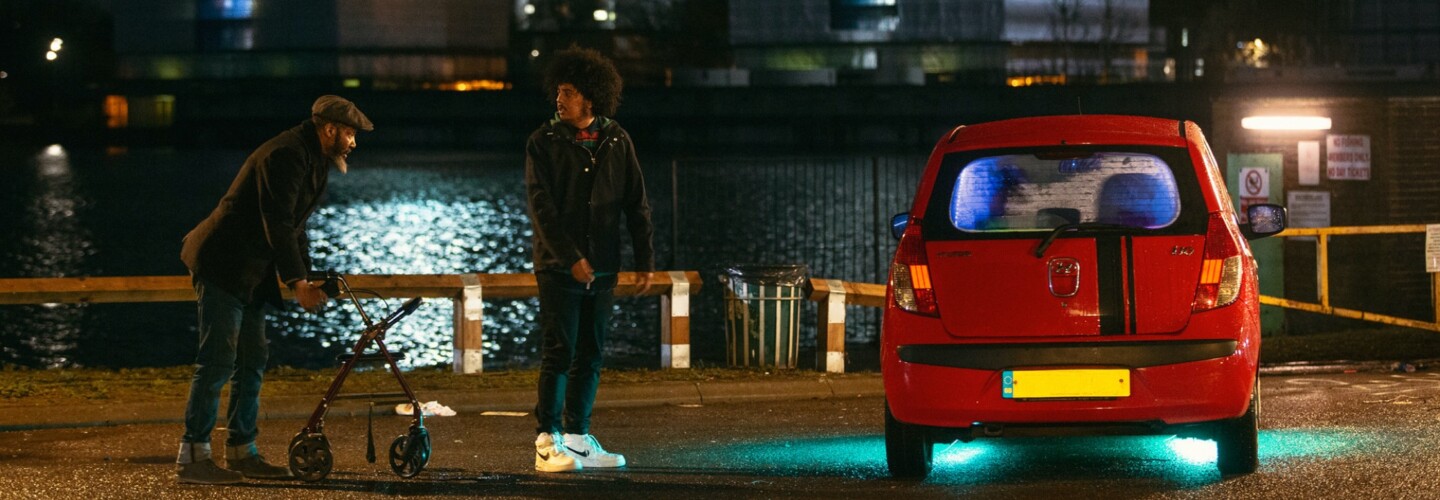
As I’m sure many filmmakers have experienced, pitching stories from the heart can often be an advantage which is exactly the experience Writer/Director Grant Taylor had with his touching comedy drama Ecstasy. When the unexpected opportunity arose to pitch at Cine Circle, he pulled directly from his own experiences with his father’s Parkinson’s diagnosis and the keen memory of a documentary he had watched about the positive effects of the infamous party drug on sufferers. The resulting film – starring British actors Brian Bovell and Nathan Bryon as a father and son on a mission to score – is a richly entertaining short which follows the pair’s near disastrous attempts to give a man an opportunity to dance with his wife at her birthday party. Taylor worked closely with his own father and cast to provide an authentic view of the suffering inherent with Parkinson’s and through finely balanced writing and an eye for bringing forth golden moments of unanticipated hilarity, Ecstasy is a breath of fresh air in a world of gritty and often depressing depictions of disability and care. After an awards laden festival run and recent online release, we spoke to Grant about the need for improvisation when pitching, finding the right balance of comedy and drama and recovering from an initial shoot day beset with issues.
While Ecstasy is an upbeat piece of work the core concept of wanting an, at least temporary, release from the symptoms of Parkinson’s is traditionally a difficult subject matter. What made you want to explore that?
When I came up with this idea I was at an all time low. I’d co-written another short film called Death by Water Pistol about disability, care and a crazy water pistol competition. We’d pitched it on the stage at BAFTA to a millionaire, got to the table read stage at Film London, and I’d spent an entire week of my holiday re-writing it every night to tackle their feedback to eventually get rejected. So close, every film fund was exhausted. I was done with filmmaking. Then out of the blue, I got an email from an event called Cine Circle about a pitching competition and where I had been meticulous in my pitch for my other short I thought, I’ll just pitch something from the heart and if I win I’ll make it and if not, I’ll reassess my life.
So, I pitched Ecstasy and the idea of ecstasy being a cure for Parkinson’s. This is a stand out memory from my youth because when I was 14 there was a documentary on the BBC about this potential revelation and after watching a man on TV transform from barely being able to bring a glass of water to his mouth to doing acrobatics I thought, “How the hell can I get my Dad and ecstasy pill?” We won the pitching competition which meant £1k of hire from VMI, then at the event someone from the crowdfunding website Greenlit was there and said you should do a crowdfund, and I met my producer there and that’s how it all came about.
For other filmmakers out there how do you think the pitch to Cine Circle differed from those you did before and meant you were able to move forward with this project?
Whenever I’d pitched before I’d been over prepared, too meticulous and had no space for improvisation. I pitched to the Stefan Allesch-Taylor film fund on the stage at BAFTA and had a very succinct two minute script but after 15 seconds they interrupted me because they loved our golden water pistol prop. I should have realised that this interruption was amazing because they were engaged but all I could think was, I need to get back to my two minute script. Sometimes you need to know a subject really well and just speak from your soul and be 100% you. The reality is that I’d pitched multiple times and got close and had lost, and you have to go through that, learn, improve and get back up again.
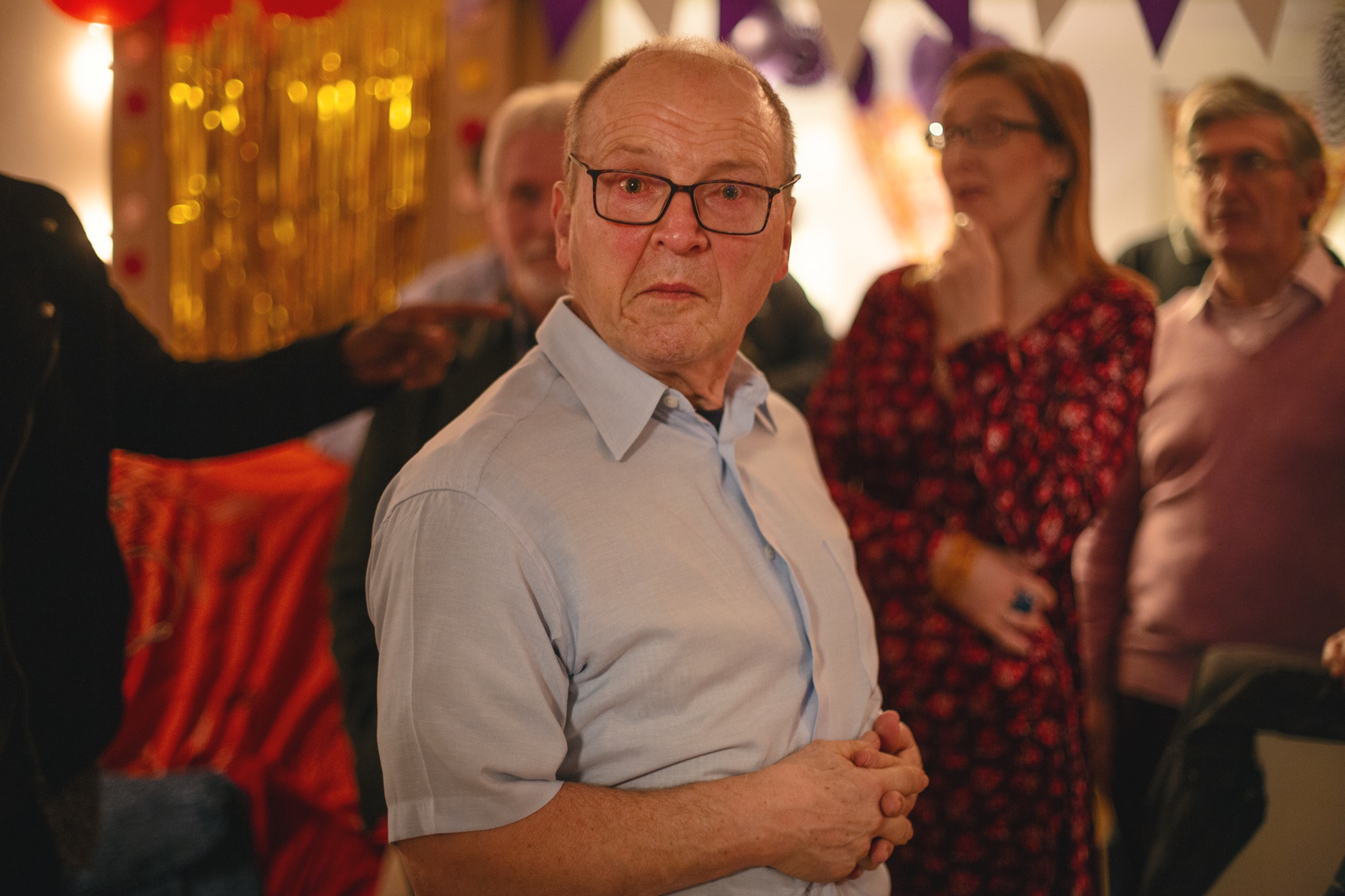
This story is obviously intimately personal to you. Can you tell us more about the writing process and reconciling the comedy and drama elements to create the right emotional balance?
The first drafts of the script were exactly that, first drafts! They were far too comedic and didn’t quite have the balance of comedy vs drama right. I think I was very intent on making something about disability and care that was entertaining and made people laugh because if you live in a world with disability and care in it, which me and my family do, you notice that most media surrounding it is horrifyingly miserable. But the more I developed it I realised that I needed to make audiences cry as well.
Sometimes you need to know a subject really well and just speak from your soul and be 100% you.
On this project I managed to get a script editor called Philip Shelley involved and he encouraged me to dig into my soul and make it more personal. The more personal it got, the better the story became and then in a late at night moment close to the shoot I realised that I needed to have my Dad in a cameo at the end of the movie. There were 17 drafts and it wasn’t until draft 13 I made that particular decision. And that’s the wonderful thing about writing, you can fundamentally shift your entire story.

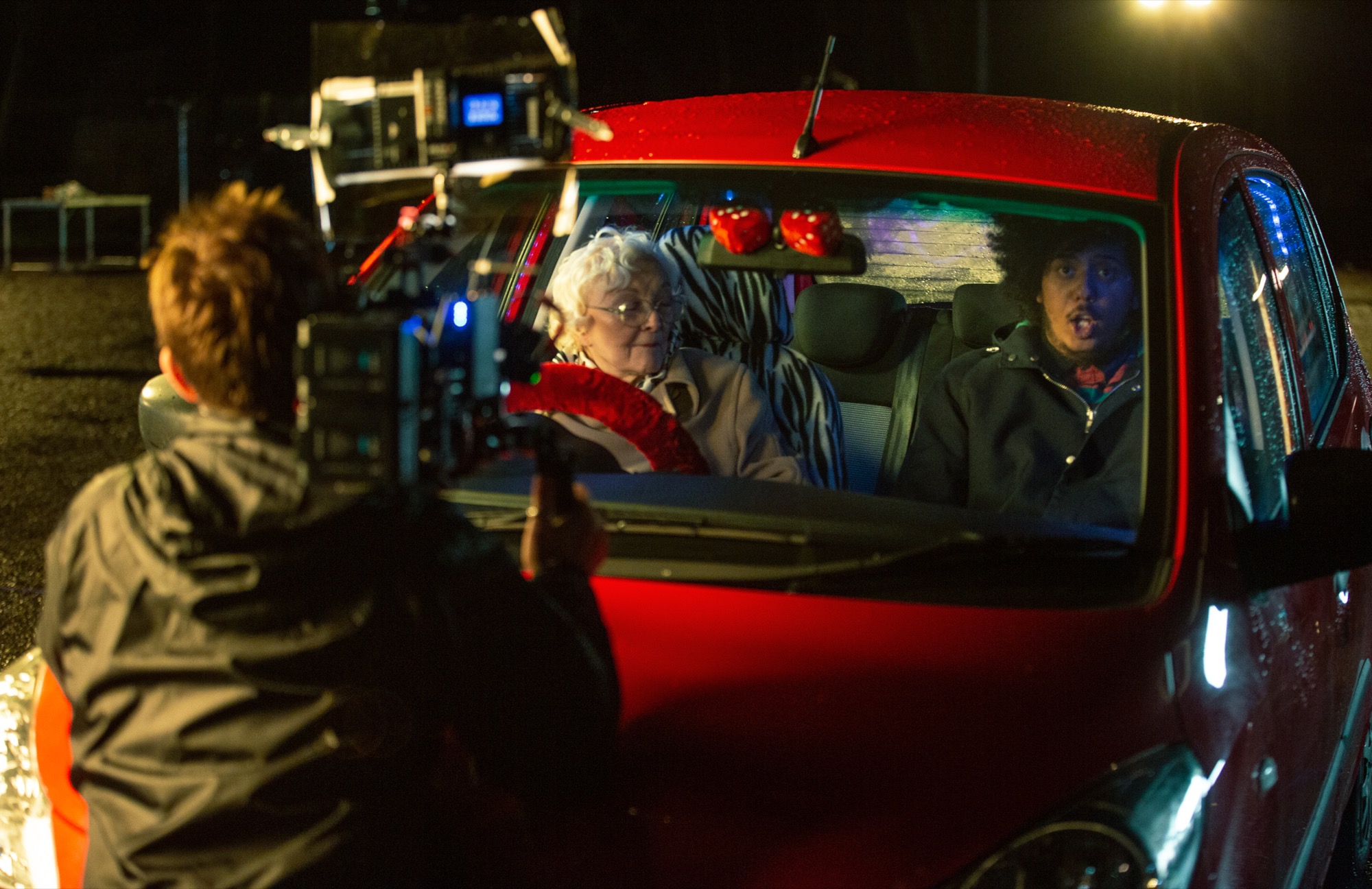
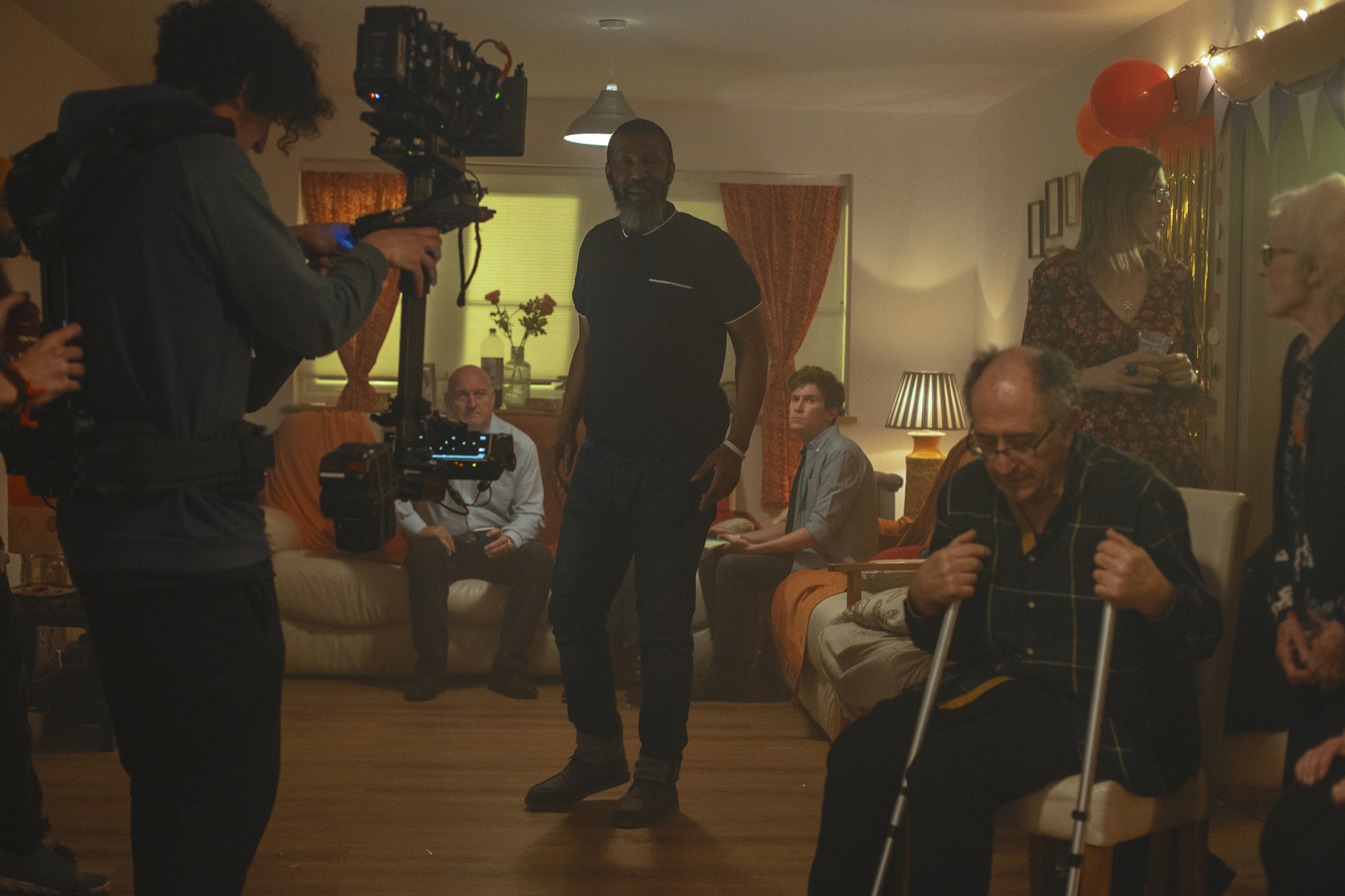
After such a rollercoaster of a journey starting the film how did the process go moving forward?
Pre-production was intertwined with crowdfunding which was stressful. But effectively I pitched the idea on September 17th 2019. I then wrote 17 drafts until we shot in early January 2020. We shot for two days and were about to shoot a pick up day on March 23rd which turned out to be the day we got locked down. Then we shot our pick up in June 2020 and then completed the film ready for a Zoom screening to our crowdfunders on April 11th 2021. Last year we were on the film festival circuit, picking up seven awards.
It’s fair to say Ecstasy was one of the hardest and most rewarding shoots of our lives. Going in we’d raised a significant amount of money from people all over the world, including the generosity of people who had Parkinson’s disease as a significant part of their lives. So there was a pressure that existed to deliver for people who wanted a bit of hope in their lives. We were ambitious going in, effectively squeezing three days of filming into two days, so we were in a situation where everything had to go right… and of course, the complete and utter opposite happened.

We wanted the camera to be handheld and have a roughness to it which linked to the character’s Parkinson’s.
All of the performances deserve recognition but that of Brian Bovell as the father is stand-out. How did you two work together for him to garner an understanding of Parkinson’s disease and the distinctive movement associated with it?
As my Dad has Parkinson’s we were able to bring the greatest level of authenticity to the film that was feasibly possible, so before the shoot we had a really special day with me and my Dad and Nathan and Brian and we were able to talk about Parkinson’s, what it feels like and Brian and my Dad were able to speak with each other and share. It’s really quite beautiful, I felt that my Dad and Brian developed a special bond during the making of the film and then I had my Dad on the film set with us which helped too. Brian was incredible and really did Parkinson’s justice, people are always telling me about the little nuances that they notice and it’s warming to know that we brought that level of authenticity to the film. I have found that having a rehearsal even on a small budget short film is essential, you want to know what you’re doing as much as possible before the shoot so on the day it’s more about minor tweaks as opposed to big alterations.
For the film we wanted the camera to be handheld and have a roughness to it which linked to the character’s Parkinson’s and the fact that he didn’t have control of his movement. Then we wanted to have a smooth Steadicam sequence for the finale for when the ecstasy has kicked in and temporarily removed his Parkinson’s symptoms.
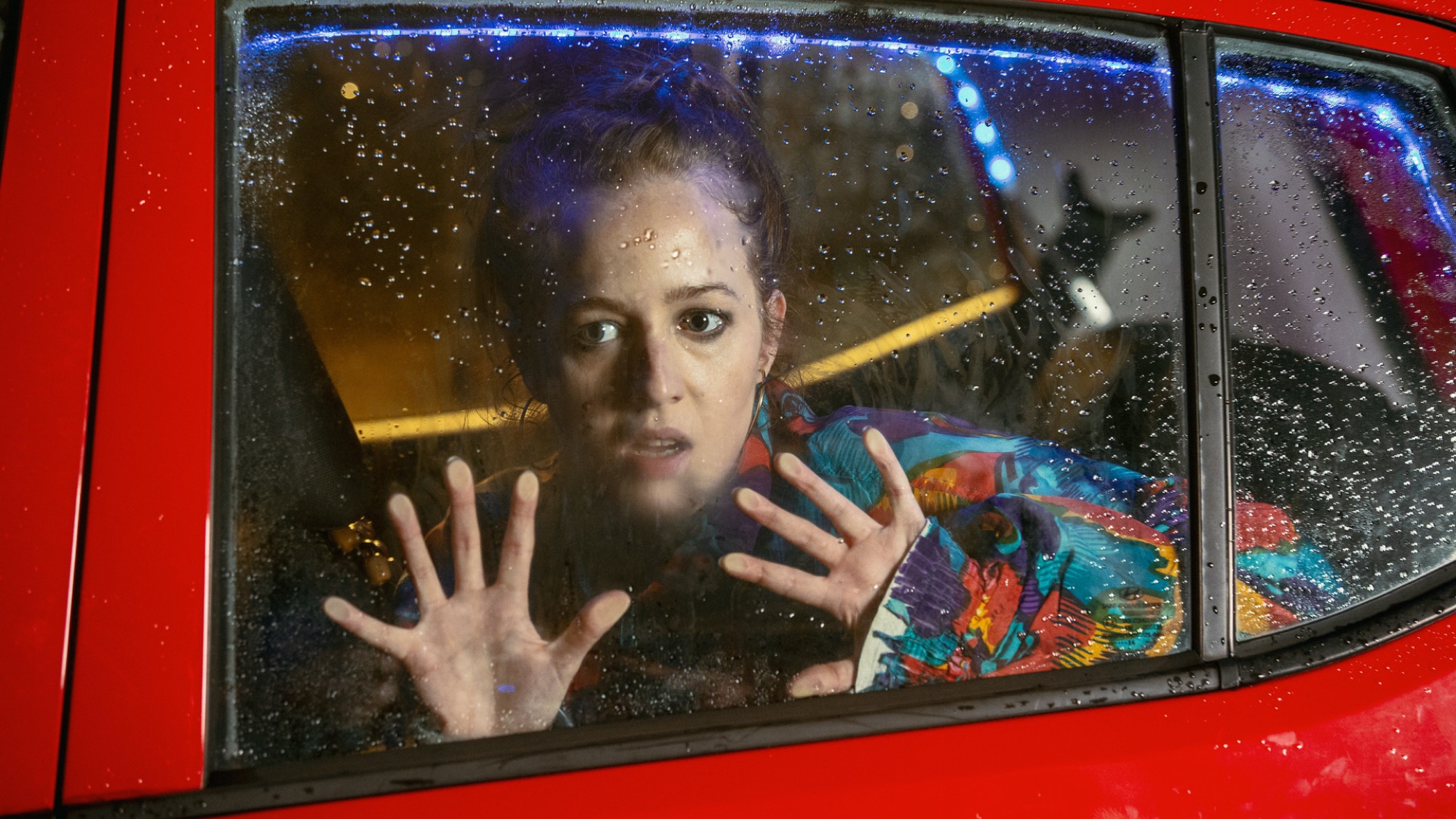
The moment Kristian and his dad persuade Gary to sell them drugs with the exclamation of “twat” is such a delightful tonal shift, switching gears from Kristian’s heartfelt speech right back into the comedy. Can you tell us more about the shooting and construction of that scene?
I think that really it all comes from the writing, the more twists and turns I put in the film the better it became. I wanted to create as many barriers as possible to them achieving their goal of getting a single ecstasy pill. They’ve gone through an ORDEAL – the Dad has nearly been run over and we’re at a point where there’s literally no reason for the drug dealer not to give them drugs. But the fact that ‘Gary the drug dealer’ decides they have morals and wouldn’t sell to a disabled person just felt like an icing on top moment and would allow us to have a real sincere moment for Nathan to pour his heart and soul out there. So we give Nathan that moment. But you know from experience, people with disabilities are so often not spoken to or subtlety ignored that I wanted to have a moment where Ian finished his son’s sentence and it’s big because standing up when you’re ‘switched off’ with Parkinson’s can take a lot of effort and for a dad to swear as well… And then because Gary is wild, I wanted it to feel as if she was going to punch the Dad and trick the audience last minute. And then it descends into chaos with a fight with the disabled walker.
I have a tear in my eye watching this scene every time, but when Holli Dempsey (Gary) says “I wasn’t going to hit him was I”, I laugh through those tears too. Practically we shot the scene in a straightforward way but isolated Kristian’s speech, Ian standing up to say “Twat” and Gary looking like she was going to punch the Dad and then punching Kristian at the last minute. All round, the performances and the way we captured it was great and then the Editor Gonçalo Sa Correia really cut it well to give the audience the ups and downs we wanted.
I would recommend a pick up day on every shoot if you can because you just don’t know until it’s cut together and the filmmaking process is one where you can continually make a film better.
Speaking of which, how was your edit? I imagine you had less footage than you wanted given that you hit some hurdles during your incredibly tight shooting days.
I mean we shot for two days. Day one was incredibly tough going and everything that could have gone wrong went wrong. We edited the film with what we had and it worked, but it just lacked some nuance and clarity and certain emotional beats were not landing like we wanted. So actually having that third pick up day was a huge benefit because we got to iron all these things out and shoot for a third day with a complete laser focus on what we needed to get. I would recommend a pick up day on every shoot if you can because you just don’t know until it’s cut together and the filmmaking process is one where you can continually make a film better.
There’s a quote, “A film is never finished, it’s abandoned”. I think secretly the editor loved the fact that we were going back for a third day because he could ask for things that he knew would improve the film. The main thing we focussed on was the emotional side of things, you cannot believe how much changing a reaction from one second to two seconds affects things. It was always about getting the audience to feel something.
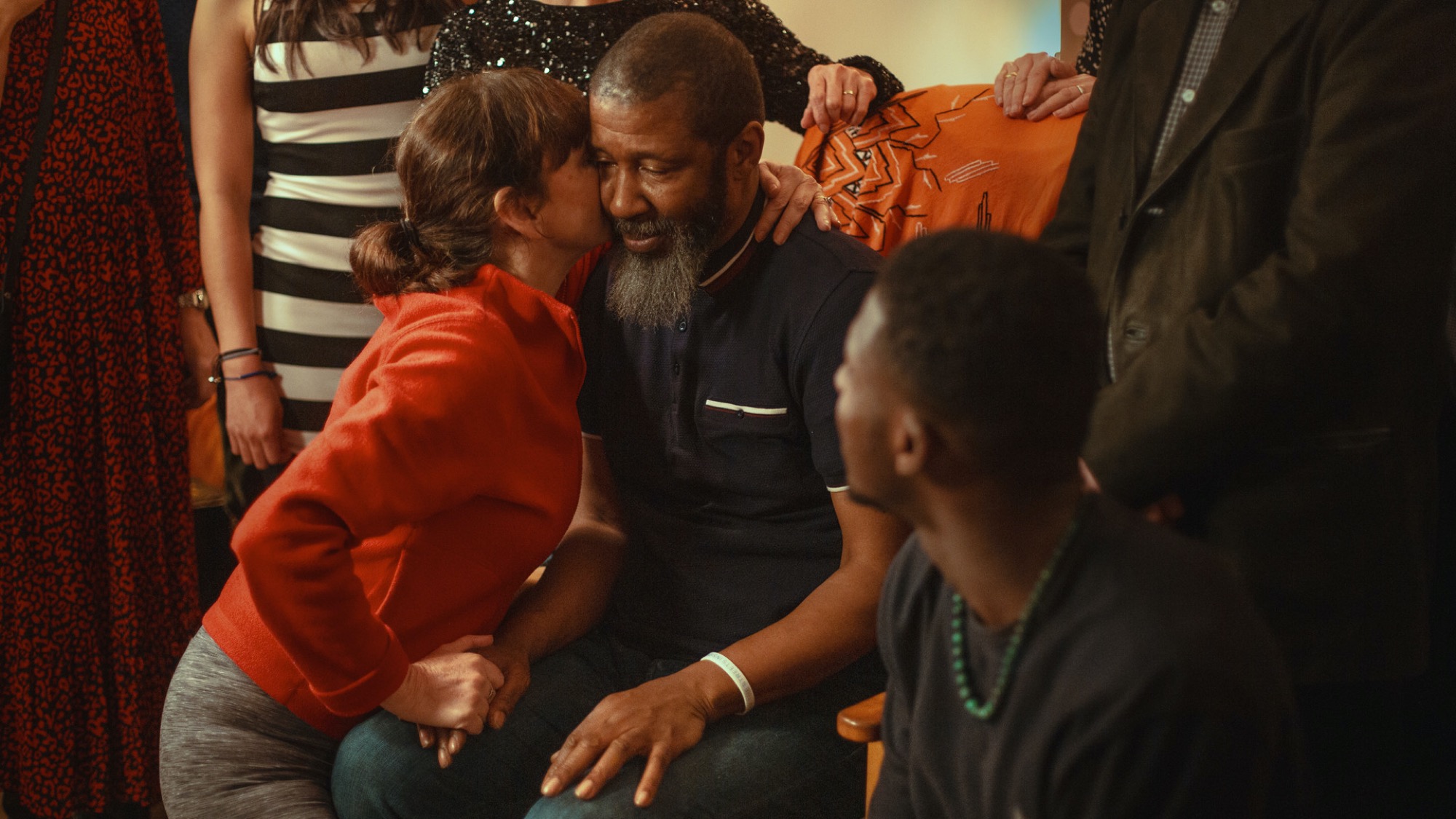
What’s next for you? Has Ecstasy reignited your passion for filmmaking?
It has been an emotionally draining journey, that’s because the film was made in tandem with crowdfunding and we had so many people connected with Parkinson’s donate, so the film took on way more of a responsibility than I first thought. Making this film made me realise that I didn’t want to shy away from the fact that I have disability and care in my life. Before I never wanted to touch that, but now I realise that I can do a lot of good by telling hopeful and positive stories about disability and care. That’s my passion and those stories are the ones I have to tell.
I’ve shot another short film called Blinded by the Lights about a blind man, and I’ve written a number of TV pilots that I’m putting out there. And I even sat down and wrote Ecstasy out as a feature film. It was long listed for last year’s Creative England, Netflix competition and I plan to keep working on it and improving it because more often than not every time you touch it, it gets better.

